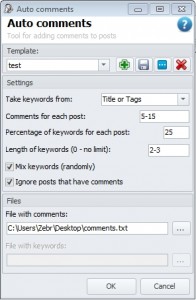Auto comments
The tool is supposed to create post commentaries with needed keywords.
Settings:
- Take the keywords from – the source of the keywords
- Comments for the material – the range of a possible number of commentaries which is added to the post by the program.
- Keywords percentage for one material – percentage of the commentaries containing keywords. The rest of the commentaries are neutral – do not contain the keywords (for the number).
- Keywords length – the allowed number of words in the keyword /phrase. If the number is to big – it is being cut. If, for example, it is 0 – there are no restrictions.
- Randomize the keywords - example: it was "plastic windows in Moscow", became "in Moscow plastic windows "
- Omit the posts containing commentaries – otherwise adds to already existing.
Format of the files with commentaries
Files with commentaries are formatted as a list where every new line is a new commentary. Every commentary must have the line ((keywords)) – it indicates a place of the keywords insertion. If there is no such line, the program will not know where to insert the keywords, hence it won’t be able to perform its main task.
If the commentary is being used a neutral (i.e. without the keyword), the line will be removed. To avoid defective commentaries one more rule has been developed: all the lines in double brackets are displayed only when the commentary contains the keywords, otherwise they will be deleted. The easiest way to understand what is written here is to look at an example. For example you have a comment:
I just have started to research this - ((keywords))
If a comment with a key, then will get something like:
I just have started to research this - "Discrimination in US"
But neutral comment will be like:
I just have started to research this -
Not a very nice and suspicious, but if you make a template comment as follows:
I just have started to research this(( - ))((keywords))
Then the result will be quite meaningful:
I just have started to research this
But that's not all. The program can handle the design options, such as:
I just {{today|yesterday}} {{have started to research|{{finished|started}} research}} of this topic - ((keywords))
You can receive many variants of one meaningful commentary. However, there is one minus. The program selects a random variant every time, and there is a chance to get two identical commentaries. But the chance is rather small, and the chance of these two commentaries to get into one topic is even smaller. But if you want you can multiply such construction to a large number of unique variants with the help of other utilities before using Auto commentaries.


